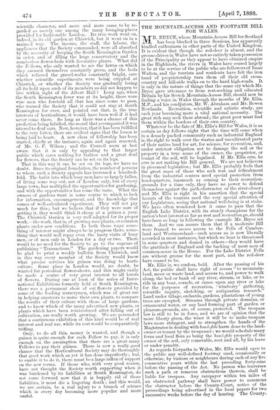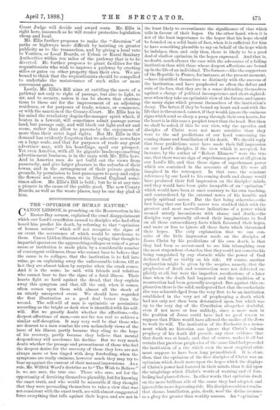THE MOUNTAIN-ACCESS AND FOOTPATH BILL FOR WALES.
MR. BRYCE, whose Mountain-Access Bill for Scotland has been blocked in three Sessions, has apparently kindled enthusiasm in other parts of the United Kingdom.
It is evident that though the red-deer is absent, and the grouse-drives in Wales have not so entirely taken possession of the Principality as they appear to have obtained empire in the Highlands, the rivers in Wales have ceased largely to be at the service of the public who are followers of Isaac Walton, and the tourists and residents have felt the iron hand of proprietorship turn them off their old cross- country and hill-side walks on to the hard high-roads. It is only in the nature of things that the same cry which Mr. Bryce gave utterance to from rest-seeking and educated Britain by his Scotch Mountain-Access Bill, should now be finding a voice in Wales through the mouths of Mr. Ellis, M.P., and his coadjutors, Mr. W. Abraham and Mr. Bowen Rowlands. Recreation, scientific and artistic study, are each year becoming more a vital national necessity. The great rich may seek these abroad; the great poor must find them within the borders of their own country.
Whatever be the fate of Mr. Ellis's Bill for Wales, it is as certain as day follows night that the time -will come when in a densely packed community such as industrial England is, the right to walk over the wastes and uncultivated parts of their native land for art, for science, for recreation, and, under strictest obligation not to damage the soil or the property in a true sense of the owner, the proprietor, or tenant of the soil, will be legalised. If Mr. Ellis errs, he errs in not making his Bill general. We are not believers in piecemeal legislation ; but Mr. Ellis probably feels that the great mass of those who seek rest and refreshment from the industrial centres need special protection from head-quarters, inasmuch as coming to their recreation- grounds for a time only, they have no power to defend themselves against the path-obstructor or the river-closer; and Mr. Ellis is right in his assertion that the special haunts of the tourists need the very special attention of our Legislature, seeing that national well-being is at stake. We have often wondered how it came to pass that the English Lake District, with its sturdy champions for the nation's best interest as far as rest and recreation go, should have been so long in following the example Mr. Bryce set them. And we can assure them that if a moderate Bill were framed to secure access to the Fells of Cumber- land and Westmoreland—such access as is now liberally accorded in most instances, but which we hear is threatened in some quarters and denied in others—they would have the gratitude of England and the backing of most men of common-sense in the House. For the Lake District Fells are without grouse for the most part, and the red-deer have ceased to be.
Mr. Ellis is, we confess, bold. After the passing of his Act, the public shall have right of access "to mountain- land, moor or waste land, and access to, and power to walk along, the bed or bank of any river, stream, or lake, or to ride in any boat, coracle, or canoe upon any river or lake for the purposes of recreation, wimberry ' gathering, scientific inquiry, sketching, or antiquarian research." Land under tillage, orchards, gardens, plantations of young trees are excepted. Streams through private domains, or ornamental water, or any land forming part of garden or pleasure-grounds, are, of course, protected. The trespass law is still to be in force, and we are of opinion that the more liberty given, the wiser it will be to make trespass laws more stringent, and to strengthen the hands of the Magistrates in dealing with bond -fide harm done to the land- owner or tenant by the trespasser; we would schedule many ferns and local flora as being the bond-fide property of the owner of the soil, only removable, root and all, by his leave or under penalty. As regards footpaths in Wales, Mr. Ellis would open to the public any well-defined footway used, occasionally or otherwise, by visitors or neighbours during each of any five consecutive years within the last preceding forty-nine before the passing of the Act. No person who traverses such a path or removes obstructions thereon, shall be liable for trespass. Any ratepayer within ten miles of an obstructed pathway shall have power to summons the obstructor before the County-Court, notice of the proceedings being advertised in the local papers for two successive weeks before the day of hearing. The County- Court Judge will decide and award costs. Mr. Ellis is right here, inasmuch as he will render protective legislation cheap and local.
Mr. Ellis further proposes to make the " diversion " of paths or highways more difficult by insisting on greater publicity as to the transaction, and by giving a local veto to Vestries, or Local Boards, or Urban or Rural Sanitary Authorities within ten miles of the pathway that is to be diverted. He further proposes to grant facilities for the requisitionists who wish to improve a pathway by erecting stiles or gates on other property than their own. We are bound to think that the requisitionists should be compelled to undertake the maintenance of such stiles or more convenient gates.
Lastly, Mr. Ellis's Bill aims at entitling the users of a pathway not only to right of passage, but also to light, to air, and to scenery, unless it can be shown that obstruc- tions to these are for the improvement of an adjoining residence, or for purposes of trade, science, or commerce, or with the sanction of the County-Court. Mr. Ellis has in his mind the retaliatory dog-in-the-manger spirit which, if beaten in a lawsuit, will sometimes admit passage across land, but passage only, and will block out light and air and scene, rather than allow to passers-by the enjoyment of more than their strict legal rights. But Mr. Ellis in this demand has evidently forgotten that we advertise nowadays on a large scale, and that for purposes of trade any great advertiser may, with his hoardings, spoil our prospect. Yet even America, with all its gigantic landscape-marring advertisement business, is in the main with Mr. Ellis here. And in America men do not build out the views from passers-by, and give larger pleasure in the suburbs of their towns, and in the arrangement of their private garden- grounds, by permission to foot-passengers to peep and enjoy the flowers and scene, than we in liberal England some- times allow. Mr. Ellis's Bill is bold; but he is at any rate a pioneer in the cause of the public good. The new County Boards, as well as the waste places, may be one day glad of him.



































 Previous page
Previous page